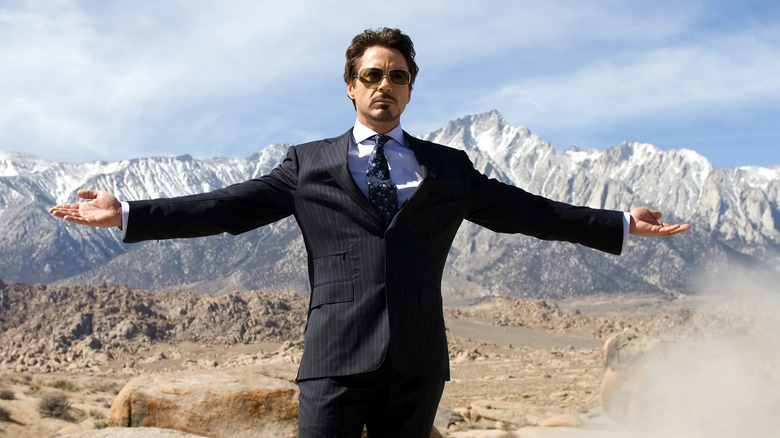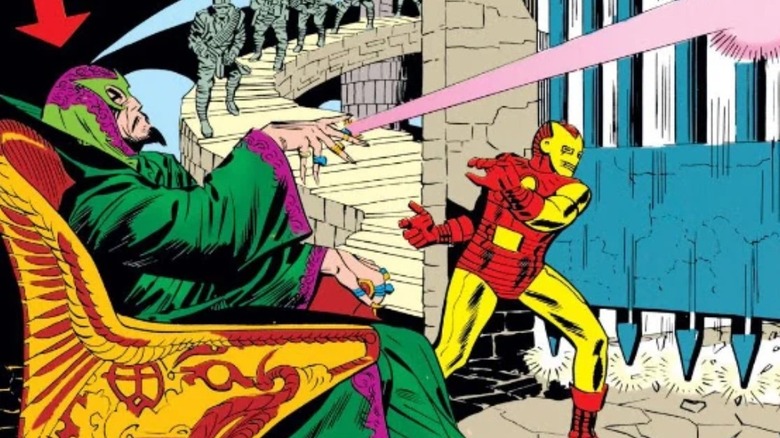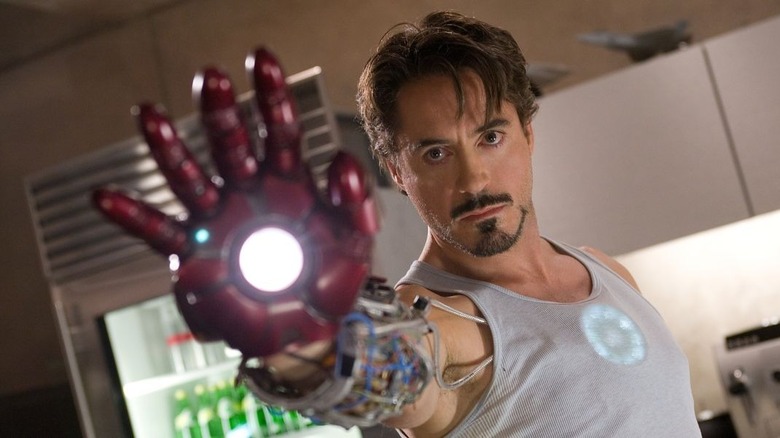The Iron Man Comics Baffled The Writers Tasked With Launching The MCU
If you keep up with superhero movies, you probably know how Marvel Studios started as an underdog and became a behemoth. The omnipresent Cinematic Universe all started with 2008's "Iron Man," which was far from a guaranteed hit; the title character was a B-list comic star at best, and comeback vehicles (like this was for Robert Downey Jr.) can be anything but.
According to the recent behind-the-scenes book "MCU: The Reign of Marvel Studios" by Joanna Robinson, Dave Gonzales, and Gavin Edwards, even the film's writers didn't initially know if it would work. Their concerns went back to the source material. The most famous "Iron Man" comic was and is "Demon in a Bottle" (by David Michelinie, Bob Layton, and John Romita Jr.), about Tony Stark succumbing to and then beating alcoholism.
During the Bronze Age of Comics (the 1970s), superhero stories gestured to social relevance. "The Reign of Marvel Studios" says that writers weren't keen on such a premise being a blockbuster hit, invoking Billy Wilder's 1945 message movie "The Lost Weekend" when describing what these writers imagined. Even if "Iron Man" stayed away from "Demon in a Bottle" (as it ultimately did), the fundamentals of the character were their own problem. Tony Stark is a billionaire weapons manufacturer — in the early 2000s' zeitgeist, a much easier fit to write as a villain. Writer Matt Holloway explained:
"We're in two wars, Iraq and Afghanistan, and the vice president [Dick Cheney] was formerly the CEO of Halliburton, the weapons manufacturer. We're going to take that kind of guy and make him a hero. How do we do that?"
Marvel Comics legend Stan Lee had asked a similar question when devising Iron Man with Larry Lieber, Jack Kirby, and Don Heck.
Iron Man, commie smasher
As Lee once explained, Iron Man's whole character was a self-imposed challenge, since a lot of Marvel Comics' readers were counter-cultural college students.
"It was the height of the Cold War. The readers, the young readers, if there was one thing they hated, it was war, it was the military. So I got a hero who represented that to the hundredth degree. He was a weapons manufacturer, he was providing weapons for the Army, he was rich, he was an industrialist. I thought it would be fun to take the kind of character that nobody would like, none of our readers would like, and shove him down their throats and make them like him."
The authors of "MCU: The Reign of Marvel Studios" suggest this was Lee "trying to retrospectively discern the logic in his improvised decisions." Even so, that improvisation became ethos once Iron Man arrived in the funny pages.
Let's be blunt; Iron Man is a conservative character. Tony Stark may often be written as a "futurist" but he's still a billionaire industrialist. The early Iron Man comics are unmistakable as a product of the Cold War, sometimes veering into propaganda. Take a look at his origin, told in "Tales of Suspense" #39. Stark is touring Vietnam and is kidnapped by the warlord Wong-Chu (a Yellow Peril caricature, down to the broken English and the shading on his skin). Tony, slowly dying from shrapnel in his heart, is conscripted by Wong-Chu to build weapons. Instead, he builds the Iron Man armor prototype to escape.
The demon in a bomb
From there, many of Iron Man's early foes are "Reds," from the Crimson Dynamo to the Black Widow (pre-reformation to a hero). His arch-foe the Mandarin (introduced in "Tales of Suspense" #50 by Lee and Heck) revisits the orientalism of Wong-Chu and invokes fears about communist China.
It's fitting that Iron Man has, in modern media (including the Marvel Cinematic Universe), become a foil for Captain America. The two characters are products of different eras in American conflict: Cap is the patriotic righteousness of World War 2 where the U.S.' opponents were definitely the bad guys. Stark, meanwhile, represents the paranoid imperialism of the Cold War.
Take a look at the "Spider-Man: Life Story" comic mini-series by Chip Zdarsky and Mark Bagley (imagining a Marvel Universe where the heroes kept aging after getting their powers in the 1960s). During the Vietnam War, Cap goes rogue on the grounds of an unjust war and fights to protect the locals from American soldiers. Meanwhile, Iron Man continues his role as an iron fist against Eastern influence and ends up being an antagonist throughout the book.
That's one way to reinterpret Iron Man. How did the film do it in a more positive light? "Iron Man" chose to embrace Tony's career as a weapons manufacturer; his origin is ripped almost exactly from "Tales of Suspense," except with the setting shifted to Afghanistan. Changing the context from the Cold War to the War on Terror was a natural choice, and the result was a story about redemption.
A hero for the War on Terror
When he's first introduced, the movie version of Tony Stark is an arrogant sleazebag who is totally indifferent to living off blood money. After being kidnapped, he sees how weapons his company built are destroying lives in the Middle East. Here's where the film makes a twist on the mythology: when Tony is rescued, he pulls Stark Industries out of weapons manufacturing (unlike the comics, where he kept making weapons for the "honorable" fight of the Cold War).
The final villain of the "Iron Man" movie turns out to not be a foreign terrorist, but Tony's business partner Obadiah Stane (Jeff Bridges). The problem of war is exacerbated by death-dealing ironmongers, so Stark can't play the weapons-building game and be a hero. Writer Art Marcum said:
"'X-Men' was proving that you could tell interesting metaphorical stories through superheroes. But I don't think we were ever self-consciously saying, 'Hey, let's make this the riposte against things that are already out there.'"
To be sure, "Iron Man" doesn't totally reckon with the evil of the military-industrial complex. What shakes Tony is how terrorists have gotten their hands on his weapons, which carries the implication that bombs and missiles just need to go into the right hands. His first big action scene in the perfected suit is defeating a squad of terrorists, lending credence to the very myths of liberation that got the Iraq War started in the first place. This carries over into "Iron Man 2," where Tony boasts of "privatizing world peace" and refuses to hand over his suit to the U.S. government because only he can be trusted with it. Ayn Rand couldn't have written it better (literally, read her work sometime).
No matter how you write him, Tony Stark is a self-involved character. It's Marvel Studios' luck they got an actor as charismatic as Robert Downey Jr. to play him.



